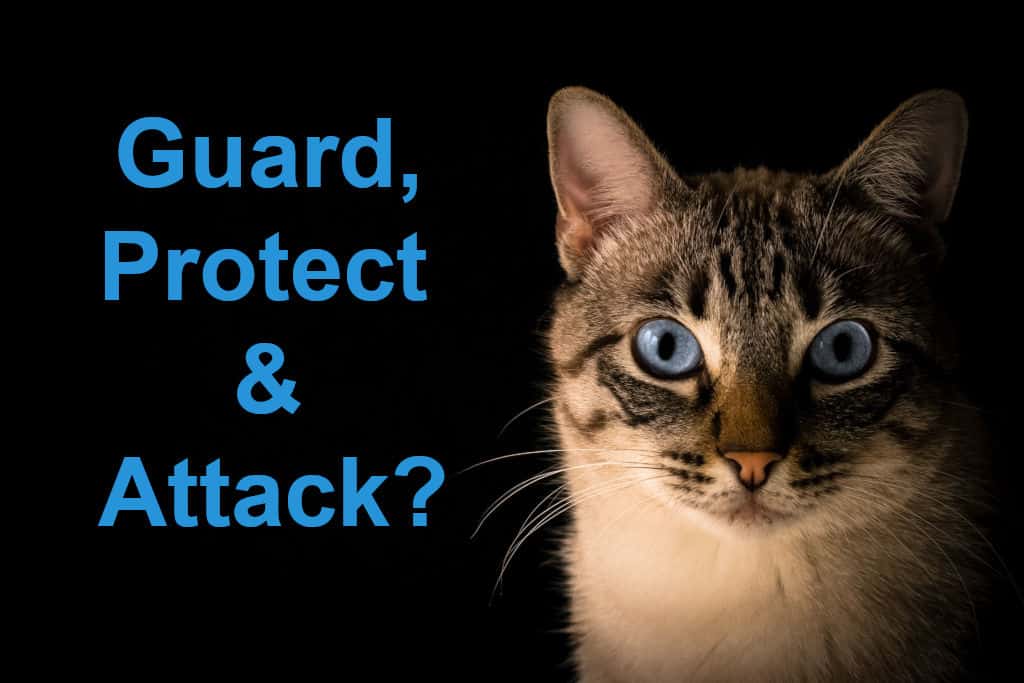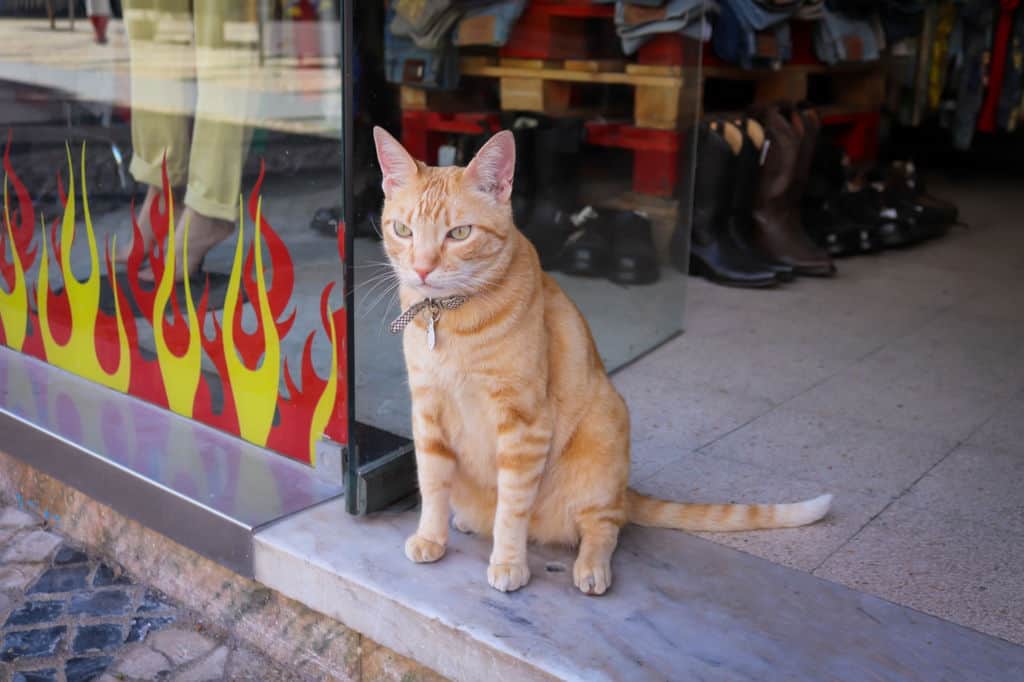Cats may attack and defend only when they believe it is required to protect themselves or their territory. What about training a cat to protect you and attack others?
While cats instinctively protect their territory and loved ones, it’s not in their nature to attack on command. They react more to perceived threats than direct cues. Teaching them to attack goes against their inherent behavior and could foster unwanted aggression.
On the other hand, if the cat is highly devoted to you, it may become very protective of you. One of my cats is highly attached to me and any intruder entering my domain is likely to be attacked by her.
The problem is that this applies to both friends and foes, and it’s irrelevant to the cat who was it.

Can You Teach a Cat to Protect Its Owner?
Cats, unlike dogs, do not defend their territories and are not group animals. When danger occurs, they are more prone to hide or flee. It’s simply in their nature.
Cats have a strong survival instinct in general. As a result, when approached by a huge animal threatening them, they tend to flee. To protect members of their families, some cats will attack dogs, snakes, and even bears, but these cats are the exception rather than the rule.
Granted, cats have been protecting their owners, but this will typically depend on the cat’s personality. Cats are predators, and predators prey on tiny animals rather than people, dogs, or other big animals. In any case, a cat is typically weaker than a dog and will choose to retreat or hide rather than fight.
What Makes Cats More Difficult to Train?
Cats are more challenging to train than dogs because they have not been bred for generations as working animals. They are too little and intelligent to enter into fights with larger species.
Because it is not advantageous to their existence as a species, the desire to do as we say never evolved in cats. Over time, we bred dogs that listened to and obeyed us. We didn’t need cats to listen to us, but to kill our mice and other tiny rodents, so we got a tamed animal that didn’t listen.
Cats can be complex regarding triggers and targets, making it challenging to develop measures to prevent or encourage aggressive feline behavior.
All other domesticated animals are herd animals with an established hierarchy, such as the Alpha dog. Humans took the position of the Alpha animal. Cats do not have to herd animals and do not have a rigid hierarchy, so training is more difficult.
Cats typically do not respond well to bops on the nose or collar tugging, as some dogs do. They respond to positive reinforcement, such as affection, treats, and fun. You may have noticed that punishing a cat usually does not work. Instead, positive reinforcement through clicker training is often used to train them to do a few simple tricks.
If you’re interested in teaching your cat to defend itself, focus on enhancing their natural reflexes through play. Toys that mimic the movement of prey can sharpen a cat’s instinctual reactions.
While it’s challenging to train a cat to attack on command, it’s not entirely impossible. However, any such training should be approached ethically, ensuring it doesn’t foster unnecessary aggression or stress for the feline.
It is not in a cat’s nature to accomplish something like guarding the owner.

Dogs are inherently protective of their owners and will defend and protect them if their owners encourage this tendency. If someone attacked the owner, a cat would naturally be more scared and would hide. A cat would also have no chance against an attacker.
They might leave some nasty scars and bites, but because they are so little compared to people, they will almost certainly be killed. A larger dog would have a better chance of repelling a human assailant.
Suggested reading: Cat Training – Train Your Cat To “Stay”
How Do You Know if the Cat Will Protect You?
When your cat is about to guard itself or you, look at the body language to see if the cat has dilated pupils or if the sharply angled ears are projected like antennas. Tail movements should also be rapid and sharp.
Your cat may trust you, but it’s tough to predict if she will protect you in a crisis.
Sitting on top of you is a cat’s ultimate expression of trust. Cats only sit in the laps of people they trust. However, a cat may flee from a larger animal when threatened.
In general, it’s never a good idea to rely on cats for protection. When a cat is in danger, their survival mechanism is to hide. Your cat may wish to assist you, but their nature will most likely prevent them from doing so.
There was the famous story of the cat who chased away a dog attacking her bay. Here’s the video of it:
People have argued that her mother’s instinct may have accounted for her remarkable fearlessness. Whether this can will always protect a child or the owner is difficult to know. One thing is sure- cats can be protectors in some situations.
Can Cats Warn You of Dangers?
Cats are brilliant and intuitive. If you believe your cat is roaming more than usual, it may have sensed that you were more attentive or upset about something and may seem protective. Because of this, a cat may become attentive as well.
Cats have exceptional hearing. If you’re home alone at night, keep an eye on your cat since it will hear sounds you don’t and will turn toward it. They’ll keep looking if the sound continues. It may be time to inspect your doors, windows, and security cameras if you have them.
There are numerous examples of heroic cats on the internet. When there was a fire in the house, some woke the owners. Another cat awoke his owner when there was a high quantity of carbon dioxide in the house and saved four people. Cats are intelligent animals that care for us as much as we do for them.
Which Are the Best Guard Cats?
Some larger cats, such as the Maine Coon, may be suitable, but it will always depend on the cat’s personality, not the breed. They are not like dogs. They are not breed-specific and rely more on the individual than anything else.
There aren’t any specific breeds of cats that can be trained to guard a home. Cats simply aren’t built for it. They are natural predators.
The main issue is that their personalities are usually suited for this only if they guard a person rather than your home. Even when protecting a person is questionable.
Unless the cat is particularly bonded to their owner and perceives a significant level of danger, likely, the cat will not care if any form of intruder or person enters your home. Because a cat cannot be trained the same way a dog can, it would be an ineffectual guard.
Interestingly, some cat owners have found success using scent markers, like the owner’s worn clothing, to establish a clear boundary the cat might be more inclined to guard. However, this doesn’t guarantee a defensive reaction, but rather a heightened awareness of the scented area.
In general, cats consider you and your home their property and territory. If the cat yells and is possessive demonstrates how much they want to defend it.
I’ve had a female cat and a couple of male cats who did this. Cats are excellent at notifying their owners when intruders are on their property, but mostly because it’s also the cat’s property.
FAQs
Why would your own cat attack you?
The cat may be acting out of irritation because she’s trying to communicate with you, but you’re not hearing her. The litter box may need cleaning. Maybe she wants different food or to go outside. If it’s a kitten, try not to play with your hands, but use proper toys, or she’ll constantly scratch you.
If all fails, take them to the vet because they could suffer from something medically severe.
Do cats love their owners?
According to one study, pet cats build attachments to their human owners similar to the bonds created by children and dogs with their caregivers. Furthermore, when momentarily denied food, access to their favorite toy, and their humans, many cats will opt to greet their humans before going to their food. It isn’t proof of love, but it’s evidence that cats have a certain level of attachment toward humans.
Do cats recognize people’s faces?
Cats are excellent at visual identification but could be better at recognizing our faces. Instead of face recognition, cats utilize other cues, the major one being our voices. Other signals include our smell, how we act, and other behavior cats pay close attention to.
What is the strongest pet cat?
If we’re talking about domestic cats, Maine Coons, and Norwegian Forest Cats are both huge and powerful breeds. Rather than developing them for aesthetic traits, they were initially kept around for their rodent-control abilities. Those breeds have the highest capacity for strength.
Alex, a passionate animal lover, has experience in training and understanding animal behavior. As a proud pet parent to two dogs and three cats, he founded AnimalReport.net to share insights from animal experts and expand his knowledge of the animal kingdom.









